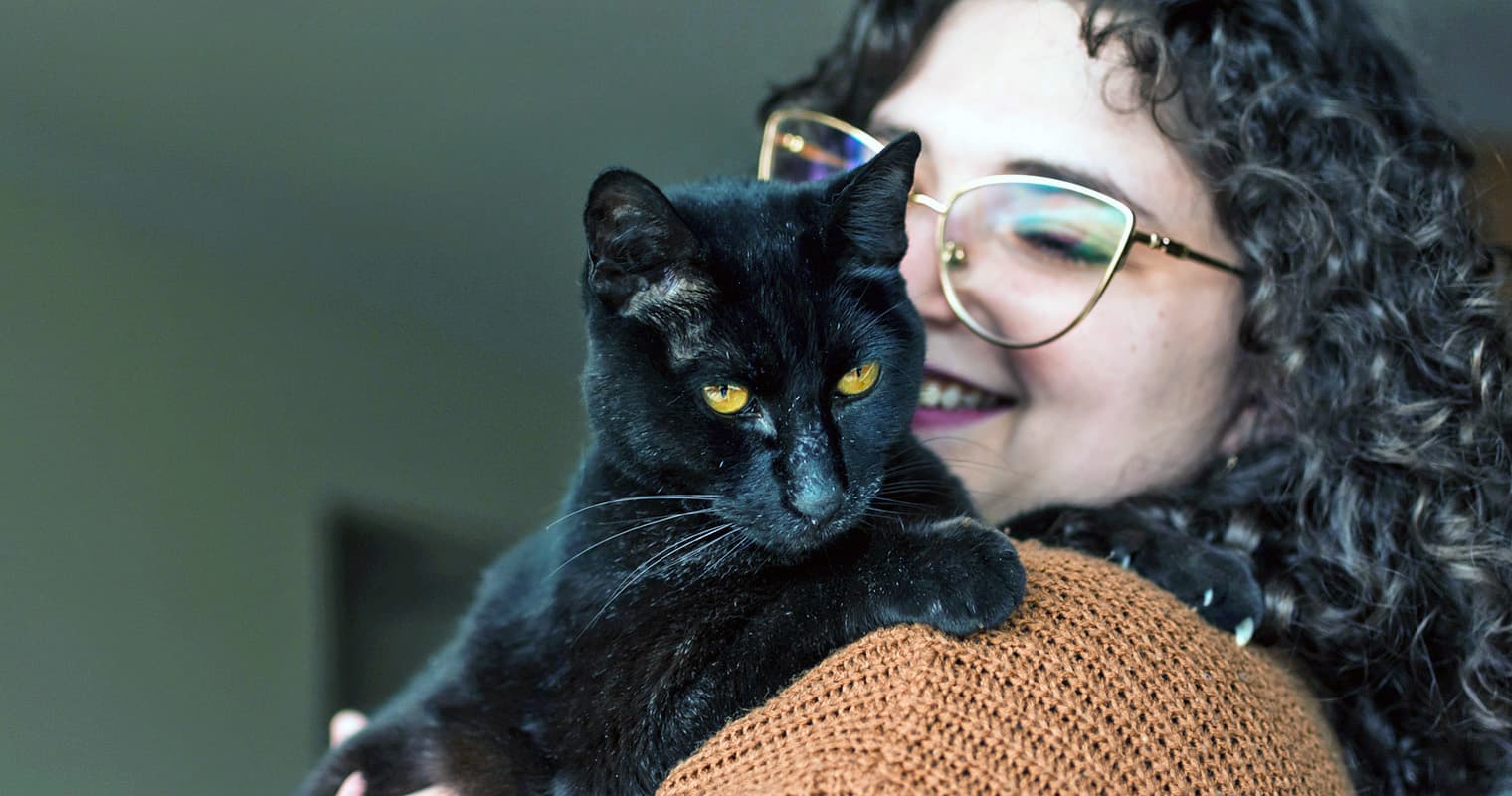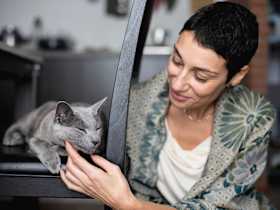Feline Herpes: What Cat Parents Should Know
Sure, this ongoing condition requires care. But for patient and committed pet parents, these cats can make great companions.
Sure, this ongoing condition requires care. But for patient and committed pet parents, these cats can make great companions.
by Adrienne A. Kruzer, BBA, RVT, LVT, | January 28, 2026

Ana Luz Crespi / Stocksy
Have you considered adopting a cat but paused when you saw the word herpes? You’re not alone — the name can sound risky. But feline herpes is a common, manageable virus in cats, and it doesn’t stop most from living long, happy lives.
While it’s essential to understand how the virus works, recognize symptoms, provide the necessary care, and take appropriate precautions to keep other cats safe — feline herpes doesn’t have to be a dealbreaker.
Feline herpes is one of several common conditions seen in pet cats. There is no cure for feline herpes, but symptoms are treatable, and cats with feline herpes can still make wonderful pets. Read on to learn what feline herpes actually means, how it’s managed, and what to consider before adoption so your new friend can feel their best.
Feline herpes, also known as feline viral rhinotracheitis (FVR), is a common infection caused by feline herpesvirus type one (FeHV-1, FHV or FHV-1). It affects cats of all ages and is especially common in shelters, rescues, and multi-cat environments.
Once infected, cats carry the virus for life, and while it can cause lifelong symptoms and pose a risk to other felines, the symptoms can be managed with routine care and veterinary guidance. Being well-versed in this disease will help you properly care for an infected cat and also help prevent other cats from becoming infected.

Vaccines vary by age, history, and other factors. Confused? Don’t be. Here’s everything you need to know to keep your kitty healthy.
While some diseases can only be spread through a bite or scratch, with feline herpes, cats don’t have to have direct contact with each other for the virus to spread; they can ingest or inhale the virus from contaminated surfaces. Unfortunately, this means that feline herpes is very contagious to other cats.
The virus particles can survive in the environment and stick to food and water dishes, toys, and other surfaces — even if an infected cat isn’t showing symptoms. Indirect transmission is more likely if the particles have not dried out — so once saliva, eye, or nose discharge dries on a surface, the virus may die off.
If you bring an uninfected cat into your home and there is an infected cat present, the uninfected cat will probably become infected, even if vaccinated. Vaccination won’t prevent infection but can reduce the severity of symptoms. Keeping your cat indoors helps limit the spread of the disease. Still, thorough cleaning of indoor surfaces and items is recommended.

Irina Gutyryak / Shutterstock
Knowing which signs and symptoms to look out for is an important part of caring for a feline herpes-positive cat. Although feline herpes is a lifelong disease, it is possible to manage the symptoms of active infections and keep your cat comfortable.
Because the virus affects the nose and throat of your cat, feline herpes makes itself known through visible upper respiratory symptoms. The respiratory signs of feline herpes can include sneezing, nasal discharge, congestion, open-mouth breathing, and coughing.
These symptoms can be minor, so sometimes pet parents don’t realize their cat has an active feline herpes infection. But they can also be so severe that your cat has difficulty breathing. You should seek veterinary attention immediately if your cat has trouble breathing or if your cat has any other health concerns.
When initially infected, a cat will typically begin showing symptoms within two to five days. These symptoms can last for a few weeks and range from minor to severe:
Sneezing
Nasal discharge
Congestion
Open-mouth breathing
Coughing
Difficulty breathing
Squinting
Ocular discharge
Corneal ulcers
Lethargy
Fever
Decreased appetite
Throughout your cat’s life, symptoms will recur when the chronic infection becomes active again.
Eye issues are commonly seen in cats with feline herpes infections. Squinting, ocular discharge that can be clear or thick, and conjunctivitis are all issues that can develop during an active feline-herpes infection. Extremely painful ulcerations of the eye called corneal ulcers are also often seen in cats with feline herpes.
Aside from respiratory and ocular symptoms, other indications of an active feline herpes infection may include swollen lymph nodes, which are difficult to see or feel. Additionally, your cat might become lethargic, develop a fever, or have a decreased appetite. The latter signs may occur due to other feline herpes symptoms causing a decrease in a cat’s ability to smell their food, and difficulty swallowing due to excessive coughing or enlarged lymph nodes. Or a cat may simply not feel well from the infection.
Secondary issues from feline herpes that are left untreated include a variety of complications such as bacterial infections, pneumonia, and even liver diseases. Thankfully, with proper treatment, this disease can be managed, and your cat can live a happy, long life.

Regular vet visits are key to keeping your pet healthy. Here’s what happens during a checkup, when to get them, and what to bring.
While there is no cure for feline herpes, it can be managed long-term. Treatment options will vary depending on the symptoms your cat is exhibiting. If your cat is experiencing minor ocular and respiratory symptoms of feline herpes, they may only need regular nose-wiping and eye-wiping to remove discharge.
But if symptoms are severe, oxygen therapy, antibiotics, eye drops, and ointments may be prescribed by your veterinarian. If symptoms worsen or lead to more serious issues, such as conjunctivitis or corneal ulcers, prescription medications will be required.
Because symptoms will be recurring, your veterinarian may also recommend some home remedies for feline herpes, such as placing your cat in a steamy bathroom for 10 to 15 minutes to help clear congestion. If your cat has any difficulty breathing, you should seek immediate veterinary attention.
Historically, an oral lysine supplement was recommended as an at-home feline herpes treatment, but this treatment is rarely used due to its ineffectiveness and concern for increasing the severity of the disease. However, there are vet-approved immune-support supplements along with various immunotherapy medications. Your veterinarian may discuss utilizing these and other options to support your cat’s immune system and decrease the severity of the infection.

evrymmnt / Shutterstock
Cats with feline herpes can make wonderful companions. Here are a few tips to consider before getting a cat with feline herpes. Being aware of and comfortable with these factors is critical to providing your cat with the care they need.
Try to prevent the spread: Extra precautions should be taken to avoid spreading feline herpes to other cats, so be sure to thoroughly wash your hands and change your clothes to avoid spreading the virus to other cats.
Think about household setup: If you’re hoping for a multi-cat household, it’s usually easiest to adopt cats who already share the virus. Otherwise, any cat with feline herpes should be the only cat in the household.
Good news for other pets: Feline herpes is species-specific, so there’s no risk to dogs and most other pets. Cats who carry the virus can safely live alongside non-feline companions.
Plan for ongoing care: Because feline herpes causes a variety of symptoms, regular care to manage and treat these symptoms will be required throughout your cat’s entire life. Administering medications, wiping eyes and nostrils, ensuring your cat is eating well, and doing what you can to avoid stressing your cat or otherwise compromising their immune system are essential.
Budget considerations: You may want to plan for higher veterinary costs because a cat with feline herpes will most likely require more visits to the veterinarian.
Insurance limitations: Pet insurance may not be available for your cat because feline herpes is considered a pre-existing condition. So set aside some money each month to pay for future medications and vet visits.
Food may be part of the treatment plan: Cats with feline herpes may require a special (if smelly) canned cat food that hydrates them and encourages them to eat, so you should budget for this type of food — and not less-expensive dry kibble.
If you’re ready to adopt, you can search Adopt a Pet for cats and filter based on criteria such as breed, age, color, and other qualities that are important to you.
Feline herpes does not spread to dogs, as this specific virus only affects cats and chinchillas. Some ailments can be transmitted from a cat to a dog, but feline herpes is not one of them. This means your dog is not at risk for contracting feline herpes and can cohabitate with your cat, as long as the pup does not stress out the cat.
Feline herpes does not spread to humans. Diseases that can be passed from an animal to a human are called zoonotic diseases and include rabies, ringworm, toxoplasmosis, and scabies, among other ailments. Cats can carry some of these zoonotic diseases, so it’s always important to ensure your new cat is free of these ailments even if they don’t have feline herpes.
Cross-Species Transmission of Feline Herpesvirus 1 (FHV-1) to Chinchillas
Herpesvirus Infection in Cats (Feline Viral Rhinotracheitis)

Adrienne Kruzer is an accomplished veterinary technician and writer with over 15 years of hands-on experience caring for domestic and exotic animals.

Adoption Advice

Breed Info

Adoption Advice

Adoption Advice
Adopting a new kitten? We’ve created a checklist to help you get organized before bringing your new friend home.

Adoption Advice
Thinking about adding another cat to your home? Here’s how to expand your family, minus the drama.

Behavior & Training

Adoption Advice
Thinking of adopting a cat? Study up and learn more about what to expect with a new cat around the house.

Adoption Advice
Looking for a reputable cat shelter? Learn more about how you can find a cat shelter that meets your expectations.

Behavior & Training